学案高中英语语法省略句。PPT课件
- 格式:ppt
- 大小:1.64 MB
- 文档页数:35
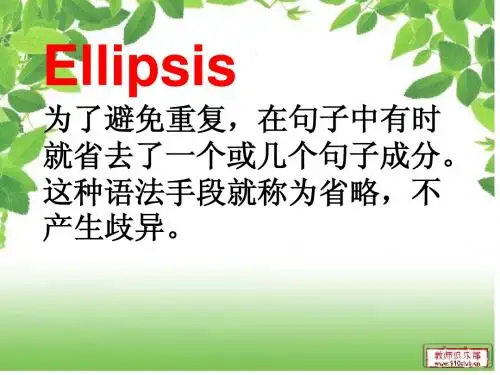
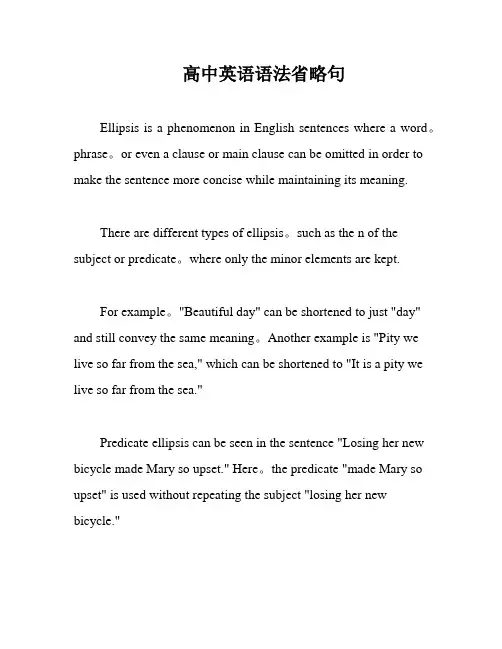
高中英语语法省略句Ellipsis is a phenomenon in English sentences where a word。
phrase。
or even a clause or main clause can be omitted in order to make the sentence more concise while maintaining its meaning.There are different types of ellipsis。
such as the n of the subject or predicate。
where only the minor elements are kept.For example。
"Beautiful day" can be shortened to just "day" and still convey the same meaning。
Another example is "Pity we live so far from the sea," which can be shortened to "It is a pity we live so far from the sea."Predicate ellipsis can be seen in the sentence "Losing her new bicycle made Mary so upset." Here。
the predicate "made Mary so upset" is used without repeating the subject "losing her new bicycle."Adverbial clauses can also be shortened。

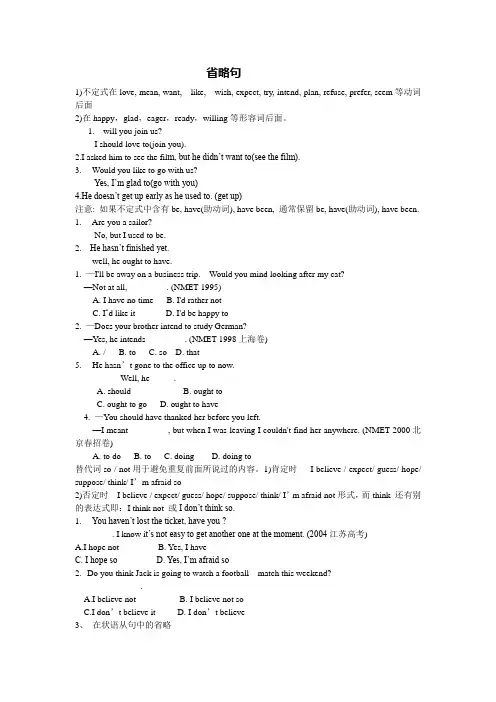
省略句1)不定式在love, mean, want, like, wish, expect, try, intend, plan, refuse, prefer, seem等动词后面2)在happy,glad,eager,ready,willing等形容词后面。
1.---will you join us?--- I should love to(join you).2.I asked him to see the fil m, but he didn’t want to(see the film).3.--- Would you like to go with us?--- Yes, I’m glad to(go with you)4.He doesn’t get up early as he used to. (get up)注意: 如果不定式中含有be, have(助动词), have been, 通常保留be, have(助动词), have been.1.--- Are you a sailor?--- No, but I used to be.2.---He hasn’t finished yet.---well, he ought to have.1. —I'll be away on a business trip. Would you mind looking after my cat?—Not at all, ________ . (NMET 1995)A. I have no timeB. I'd rather notC. I‘d like itD. I'd be happy to2. —Does your brother intend to study German?—Yes, he intends ________ . (NMET 1998上海卷)A. /B. toC. soD. that5.--- He hasn’t gone to the office up to now.--- Well, he _____.A. shouldB. ought toC. ought to goD. ought to have4. —You should have thanked her before you left.—I meant ________ , but when I was leaving I couldn't find her anywhere. (NMET 2000北京春招卷)A. to doB. toC. doingD. doing to替代词so / not用于避免重复前面所说过的内容。
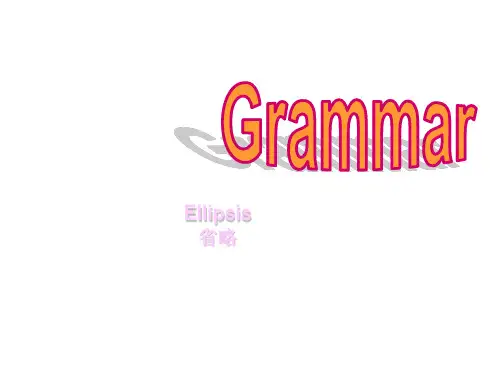

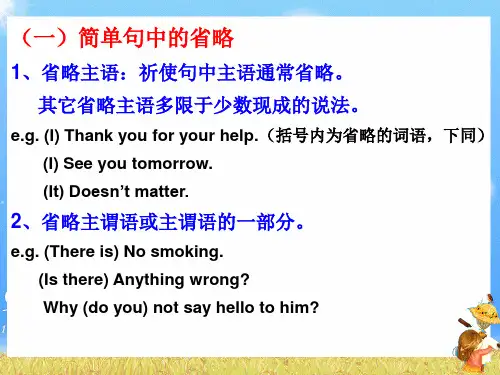
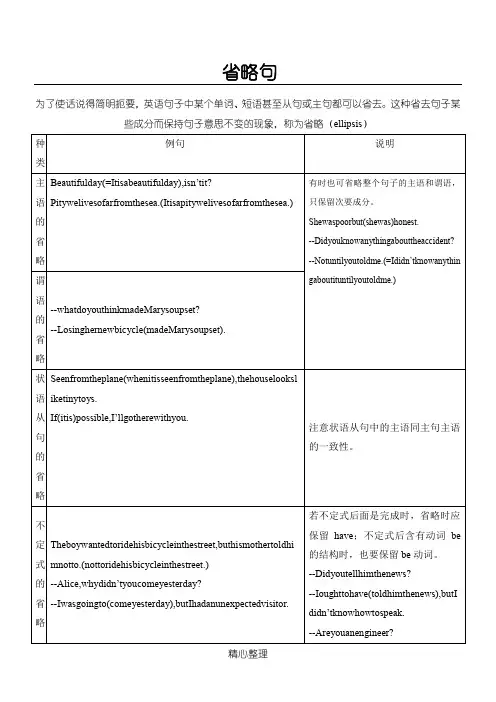
省略句为了使话说得简明扼要,英语句子中某个单词、短语甚至从句或主句都可以省去。
这种省去句子某些成分而保持句子意思不变的现象,称为省略(ellipsis)Ⅰ、状语从句中的省略用法一、如果从句的主语和主句的主语一致,且从句的谓语含有be动词的某种形式(am/is/are/was/were),可同时省略从句的主语和be动词的某种形式。
1、when,while引导的时间状语从句e.g.Dobecarefulwhen(youare)crossingthestreet.When/While(Iwas)onmywaytowork,Imether.2、3、4、二、三、以if从句为代表的状语从句中的特殊省略用法:通常省略了itis,thatis,thereis/are。
e.g.If(itis)possible/necessary,thisoldtemplewillberebuilt.If(thatis)so,Iwillcallyoubackat5:00pm.Thereareonlyafewbooksinourschoollibrary,if(thereare)any.Ⅱ、定语从句中的省略用法关系词的省略关系代词that,which,whom等在限制性定语从句中充当宾语且不位于介词之后时,可以省略;inwhich或that在先行词way后作方式状语从句时可省略。
e.g.Theman(that/who/whom)youvisitedlastnightismygrandpa.Idon’tliketheway(inwhich/that)youtreatthegirl.Ⅲ、虚拟语气中if及should的省略1、当条件状语从句中有were,had,should等时省略if,把它们提至句首,形成倒装句。
e.g.IfIwereateacher,Iwouldbestrictwithmystudents.=WereIateacher,Iwouldbestrictwithmystudents.2、1、2、E.g3、,love,hate。
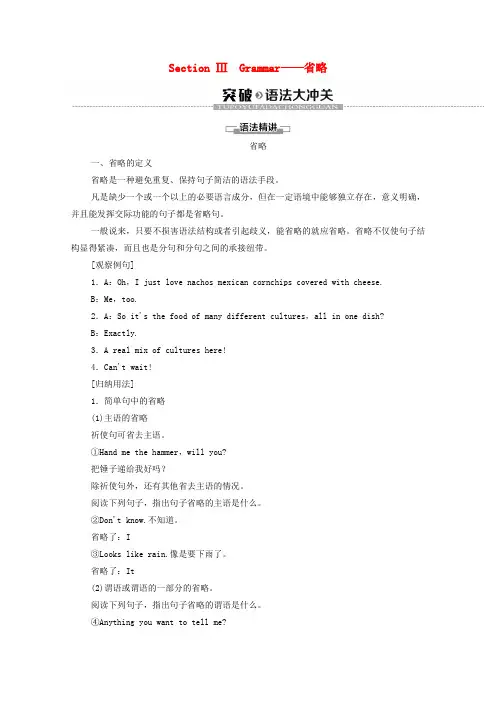
Section ⅢGrammar——省略省略一、省略的定义省略是一种避免重复、保持句子简洁的语法手段。
凡是缺少一个或一个以上的必要语言成分,但在一定语境中能够独立存在,意义明确,并且能发挥交际功能的句子都是省略句。
一般说来,只要不损害语法结构或者引起歧义,能省略的就应省略。
省略不仅使句子结构显得紧凑,而且也是分句和分句之间的承接纽带。
[观察例句]1.A:Oh,I just love nachos mexican cornchips covered with cheese.B:Me,too.2.A:So it's the food of many different cultures,all in one dish?B:Exactly.3.A real mix of cultures here!4.Can't wait![归纳用法]1.简单句中的省略(1)主语的省略祈使句可省去主语。
①Hand me the hammer,will you?把锤子递给我好吗?除祈使句外,还有其他省去主语的情况。
阅读下列句子,指出句子省略的主语是什么。
②Don't know.不知道。
省略了:I③Looks like rain.像是要下雨了。
省略了:It(2)谓语或谓语的一部分的省略。
阅读下列句子,指出句子省略的谓语是什么。
④Anything you want to tell me?有什么事要告诉我吗?省略了:Is there⑤The students still waiting?学生们还在等吗?省略了:Are(3)主语和谓语,或主语和谓语的一部分的省略。
阅读下列句子,指出句子省略了什么。
⑥(2016·浙江卷)—The movie starts at 8:30,and we can have a quick bite before we go.——电影8:30开始,我们可以快速地吃点东西就走。
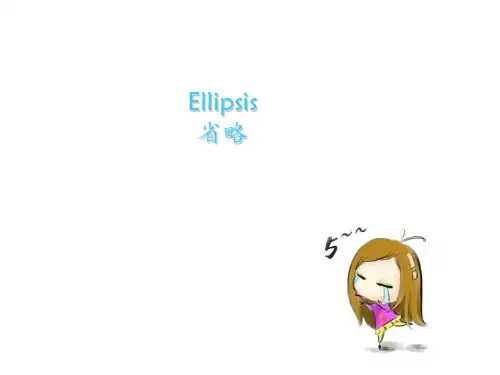
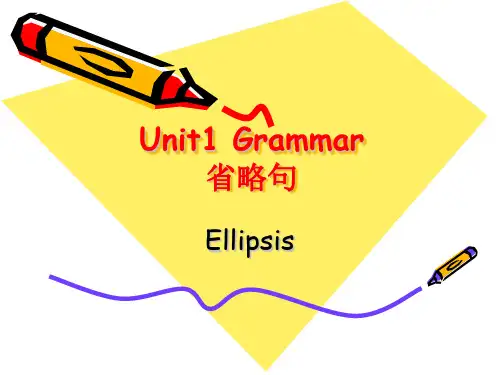
省略句1.省略句的定义省略是为了避免重复、突出新信息并使上下文紧密连接的一种语法修辞手段。
省略在语言中,尤其在对话中,是一种十分普遍的现象。
2.词的省略(1)省略介词He spent four hours (in) going over his lessons. 他花了四个小时复习功课。
I’ve studied Eng1ish (for) five years.我已学五年英语了。
(2)省略连词thatI believe (that) you will succeed.我相信你们会成功的。
It’s a pity (that) he’s leaving.他要走,真遗憾。
I’m sure (that) she will help you. 我肯定她会帮你的。
(3)省略关系代词I’ll give you all (that) I have. 我要把我所有的一切都给你。
He read the book (which) I got yesterday. 他看过我昨天买的书了。
3.句子成分的省略(1)省略主语Beg your pardon. (我)请你原谅。
(Beg前省略了主语I)Take care! 当心!(Take前省略了主语you)Looks as if it will rain. 看起来象要下雨。
(Looks前省略了主语it)(2)省略谓语Who next? 该谁了?(Who后面省略了谓语comes)The river was deep and the ice thin. (ice后面省略了was)We’ll do the best we can. 我们将尽力而为。
(can后面省略了动词do)(3)省略表语Are you ready? Yes, I am. 你准备好了吗?我准备好了。
(am后面省略了ready)He was a lover of sports as he had been in his youth. 他还是象年轻时那样,是一位运动爱好者。
高考英语考点-省略句省略句是高考考查的语法重点,又是学习的难点。
在英语中,为了使句子简洁明快,突出重点,常用"省略句",只要不影响句意的表达,能省略的成分尽可能省略。
省略现象随处可见,大致可分为以下几种情况。
一、句子成分的省略1. 省略主语。
如:Haven't seen you for ages!好久不见了!2.省略谓语。
如:(Is there) Anything you want? 你要什么东西吗?(Does) Anybody need help? 有人要帮忙吗?3. 省略宾语。
如:I don't know (where he is ). 我不知道。
4.省略主语和谓语(或谓语的一部分),只剩下表语、宾语、状语或其它成分。
如:(I'm) Afraid I can't come. 恐怕我不能来了。
(Have you) Got any ink? 你有墨水吗?【高考链接】-It’s a long time since I saw my sister.(2007全国卷1)-_________her this weekend?A. W hy not visitB. Why not to visitC. Why not visitingD. Why don’t visit解析:答案为A。
本题考察省略结构,这里why not visit =Why didn’t you visit ,这种既注重基础又兼顾生活交际的试题,其实多数学生感觉很容易能得出正确的A答案。
二、复合句的省略1.在含有状语从句的复合句中由when,while,as, once,whenever引导的时间状语从句;或由if,unless引导的条件状语从句;由though,although,even if ,even though引导的让步状语从句;由as though,as if,as引导的方式状语从句;由because引导的原因状语从句;由wherever引导的地点状语从句,若从句的主句是it或与主句的主语相同,且在谓语中含有be时,常省略从句的主语和be。